Donkeys are strong animals that are mainly known for their helping toes. They’ve been used as working animals as they are used to move heavy loads from one place to the other. Donkeys are smaller than horses, and they come in different breeds.
What we feed our donkey contributes to their overall well-being. Hence, donkey owners or guardians are always concerned about what to or what not to feed them. Donkey nutrition differs based on age and health needs. These animals are capable of surviving in any environment, including harsh environments.
Their digestive system is also built to break down food efficiently. This will help them absorb the best nutrition from what they eat. Therefore, feeding them the right food is essential, so your donkey doesn’t get prone to laminitis or become overweight.
1. What do donkeys eat?
Many people think that donkeys eat grass and are okay with just that. Leaving donkeys to feed on grass unsupervised will become overweight in no time. Some nutrients that cannot be gotten from grass alone should be included in a donkey’s diet.
Feeding donkeys can be dangerous to their health because donkeys differ from horses. Originating from Africa, donkeys originally eat wooden vegetation and shrubs and can adapt to harsh food conditions and scarce vegetation. They are natural browsers and need less starch, sugar, protein, and fiber in their diet.
If your donkeys are left to stroll in lush pastures, you must practice grazing control to keep them healthy and fit. Feed according to the donkey’s temperament, age, and weight.
Donkeys are known as herbivores, and their appetite and large teeth go well with a plant-based diet. Donkeys need a healthy but simple diet. It’s better for donkeys to eat all day than to consume their feed at a go. Apart from food, donkeys also appreciate clean water. Ensure that the water given to them is not too cold or hot.
Here is a list of foods that donkeys eat
1. Hay
Hay is essential when it comes to donkey feed. You can store them so they’ll be in excess during the winter months as they are always scarce during this season. Cow pasture hay has a higher energy level but is best appropriate when mixed with straw, seed hat, and meadow hays are also suitable for feeding donkeys. Note that hay can’t be used as a treat.
2. Straw
Straw is high in fiber and low in sugar. They do not contain excess calories and are essential to the growth of a donkey. Oat straw contains a higher nutritional value, and wheat straw has a lower energy value but is high in fiber. The straw of all forms is nutritional to a donkey aside from linseed straw that contains poisonous seed.
3. Succulents
Succulents constitute a significant contribution to a donkey’s healthy diet. Turnips, bananas, seeds, apples, carrots, and pears are safe for donkeys. Cut fruits and vegetables in small sizes to avoid a rush of choking. Vitamin and mineral supplements also help r form a balanced diet.
4. Chaff
Chaff consists of hay and straw and is highly nutritious for donkeys. Note that chaffs that are laminitis free are highly recommended.
5. Water
Water is essential to the donkey and should be available at all times. Do not serve them cold water.
6. High fiber pellet
High-fiber pellets are also very nutritious for donkeys. Ensure that your donkeys don’t eat pellets too quickly to avoid colic. Avoid cereal-grain-based pellets and opt for fiber-based pellets.
Other foods eaten by donkeys include threats (such as bananas, swedes, apples, squash, pears, sweet potatoes, turnips, and carrots), shrubs, and silage
Wild donkeys and captive donkeys often eat the above-listed foods. Baby donkeys differ because they depend on their mother’s milk at birth. At first, they may have difficulty eating grass, hay, and straw due to poor dentition.
Before you begin to feed them, invite a veterinary to address their dietary and dental issue to ensure that they receive proper nutrition. Baby donkeys need supplements that are high in fiber and can be quickly eaten.
Baby donkeys should be provided with dental care at least twice a year to address signs of dental diseases such as bad breath, dropping feed, drooling, and slow or reluctant feeding.
2. Do donkeys change their diets?
Donkeys don’t always change their diets, but when there is a need for that, the change should be made gradually between 7-14 days.
During winter or other colder months, donkeys must be fed good quality hay or haylage. Maintain the quality and ensure it doesn’t drop or increase. Feed them two to three times a day all through these months.
Donkeys don’t need to be fed hay during summer, as they’ll make do with an abundance of quality grass during this season. They need enough fiber to meet their nutritional needs during the spring and summer. Succulents should be given during early spring and winter when there isn’t enough grass to feed on.
3. How much and how often do monkeys eat?
Donkeys’ are voracious eaters; they love to eat anything that comes their way. It is important to note that donkeys should be allowed to eat at a stretch and not just once a day. Statistically, donkeys spend up t 16 hours per day on graze.
A donkey weighs between 220lbs to 1000lbs and will eat between 1..5% to 1.8% of its body weight. Donkeys consume up to 6,000 lbs of food per year. Feed your donkeys 2 to 3 times a day.
4. Donkeys’ special eating behaviors
Due to their mobile lips and narrow muzzle, donkeys always search for high-quality food. Donkeys are non-selective grazers and can eat a large variety of food without stress. They can be left to feed unsupervised, and they’ll still provide well.
The amount of time a donkey spends on eating can be based on various factors such as the overall health of the donkey, amount of fiber on the diet, level of intake, size, and form of the feed.
During group feeding, donkeys are known for struggling to gain dominance. The dominant one kicks others away and prevents them from eating, especially during seasons when there are food shortages. Also, donkeys consume food more after working hours or when there is insufficient space to eat. This can result in incomplete chewing or faster chewing.
Donkeys must chew their food properly to aid digestion; hence they suffer intestinal impaction or esophagus obstruction when they don’t chew their food correctly.
5. What not to feed donkeys
The fact that donkeys can adapt to any environment and are okay with whatever you feed them doesn’t mean you shouldn’t watch out for things they shouldn’t eat. Do not feed your donkeys with leftover meals, as they might have a hard time digesting them. Also, donkeys should not be fed horse food as it can harm their health.
Feeding your donkeys a lot of foreign grass and lush can lead to one disease. Always avoid sheep/goat or cattle feed containing monensin or urea because both are forbidden in organic feed. Also, don’t feed the donkey with moldy meals.
- Animal protein, including meat or dairy
- Chocolate
- Onions
- Potatoes
- All cakes
- All biscuits
- Broccoli
- Aubergines
- Bread
- Garlic
- Pepper
- Cauliflower
- Leeks
- Red Marple leaves
6. Common health problems associated with inappropriate diet.
1. Obesity
Obesity is a prevalent health issue with donkeys, and this only occurs when they are left to feed unsupervised. Unrestricted grazing is harmful to donkeys. Rotate grazed areas where donkeys feed to avoid parasitic worms.
2. Gastric ulcers
Gastric ulcer is another health issue faced by donkeys. This occurs when donkeys are fed with concentrates that are high in cereal. Instead, donkeys should be placed on a forage-only diet or fiber-based concentrate to avoid gastric ulcers.
3. Laminitis
Laminitis is the inflammation of the sensitive tissue in the donkey resulting in lameness and pain. This can result from excess consumption of cereal-based feed or grass. Also, when donkeys graze on fertilized foods, they can experience laminitis.
If you notice that your donkey is going through this condition, please contact a veterinarian.
General feeding guides for donkeys:
- Allow a donkey to rest adequately after grazing for a long time.
- Diets provided to donkeys should be of high quality and should contain the appropriate nutrients. Diet should have low sugar levels.
- Feed donkeys properly so they can maintain their body condition. Feeding shouldn’t be intensified after a donkey has lost its feeding condition.
- Provide enough fresh and clean water for donkeys. Donkeys are very picky with water; ensure their water is served in a clean container.
- Avoid giving donkey feeds that contain molds and foreign materials, such as plastic bags. This can be dangerous to a donkey’s health.
- Feed donkeys little foods at intervals to reduce the risk of being prone to digestive issues.
- Be consistent with a feeding method and time.
- Provide concentrate feeds to donkeys that always work and have no balance grazing time. This will help serve as a supplement to its diet.
- Do not overfeed your donkeys. Whenever you notice that your donkeys overeat, use a rope-mesh muzzle to stop them from eating.
- Do not change diets all of a sudden. Diet changes should be effected gradually within 7-12 days.
FAQ:
1. Do donkeys eat meat?
No. Donkeys are herbivores and do not eat meat. Instead, they are fond of eating desert plants, grays, hays, grasses, oats, etc.
2. What is a donkey’s favorite snack?
A donkey’s favorite snacks are fruits and vegetables. The snack shouldn’t be substituted for real food as donkeys only feed on them in small amounts, especially between diets. Examples include carrots, beetroots, apples, oranges, pears, strawberries, grapefruits, lettuce, and cucumber.
3. What is the best thing to feed a donkey?
Donkeys are natural browsers and should be fed with berries, grass, bushes, and other things in their natural environment.
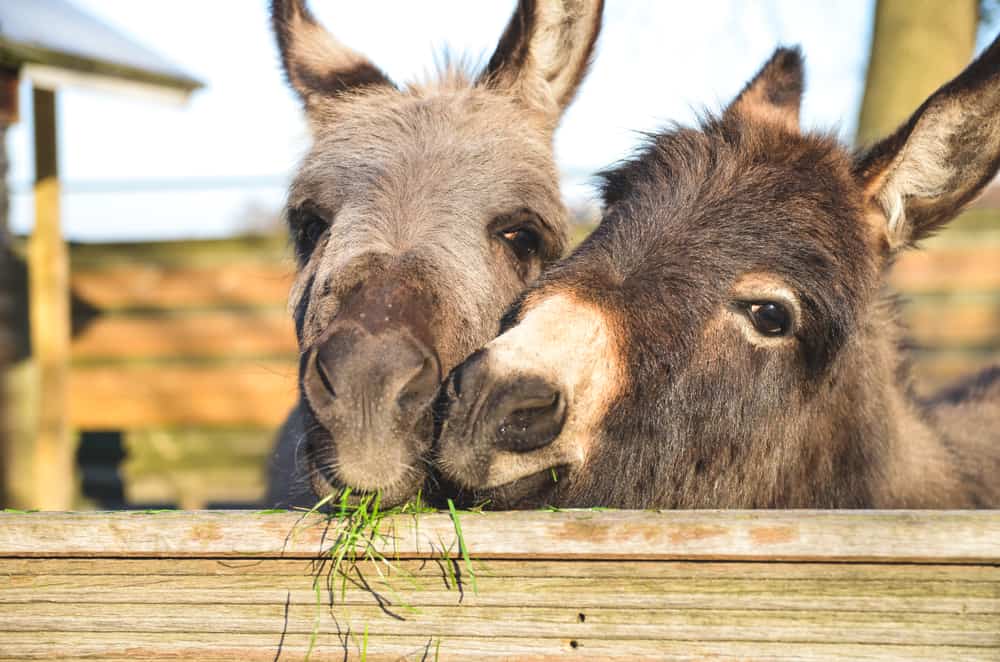
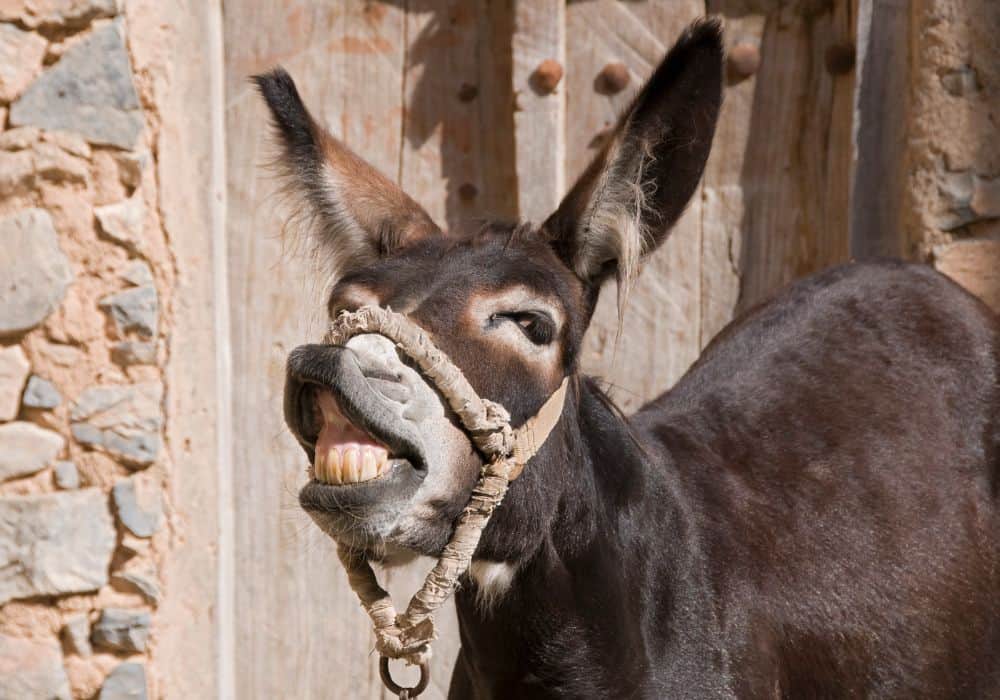
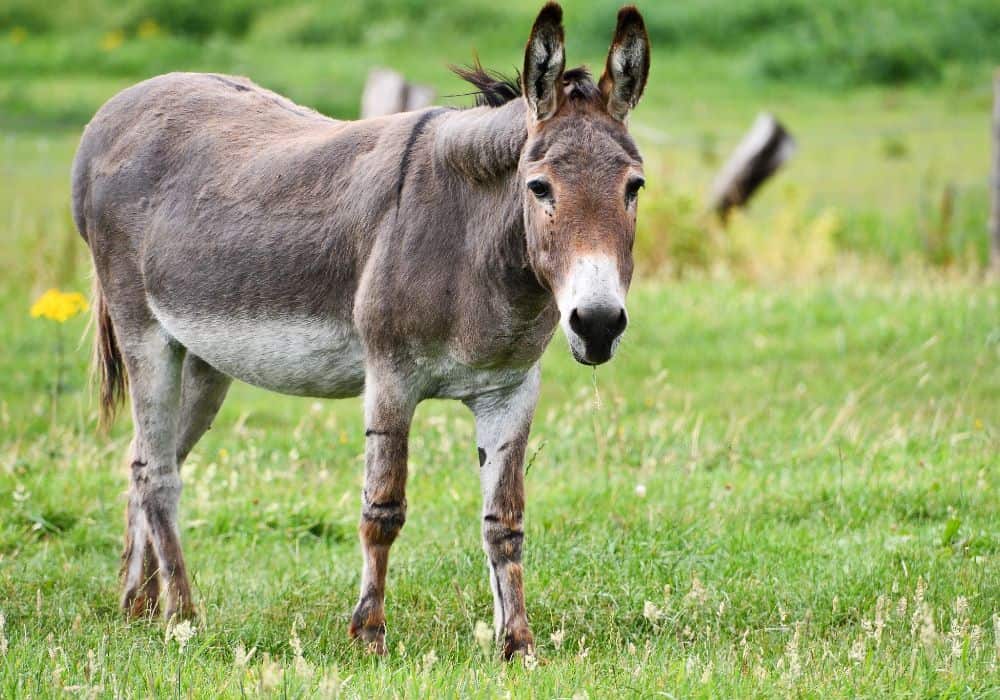
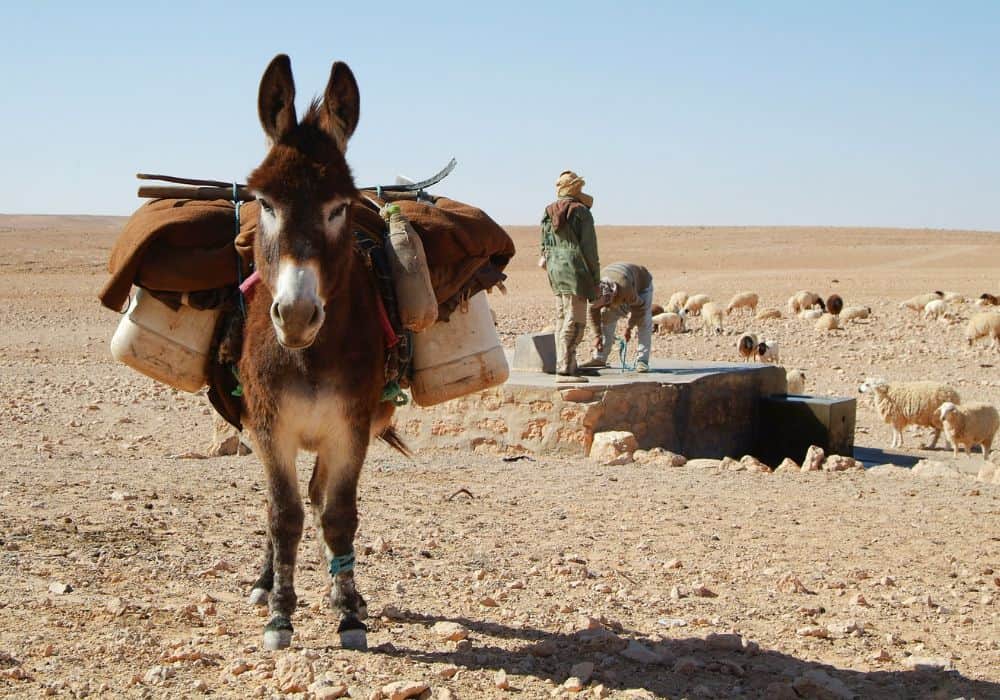
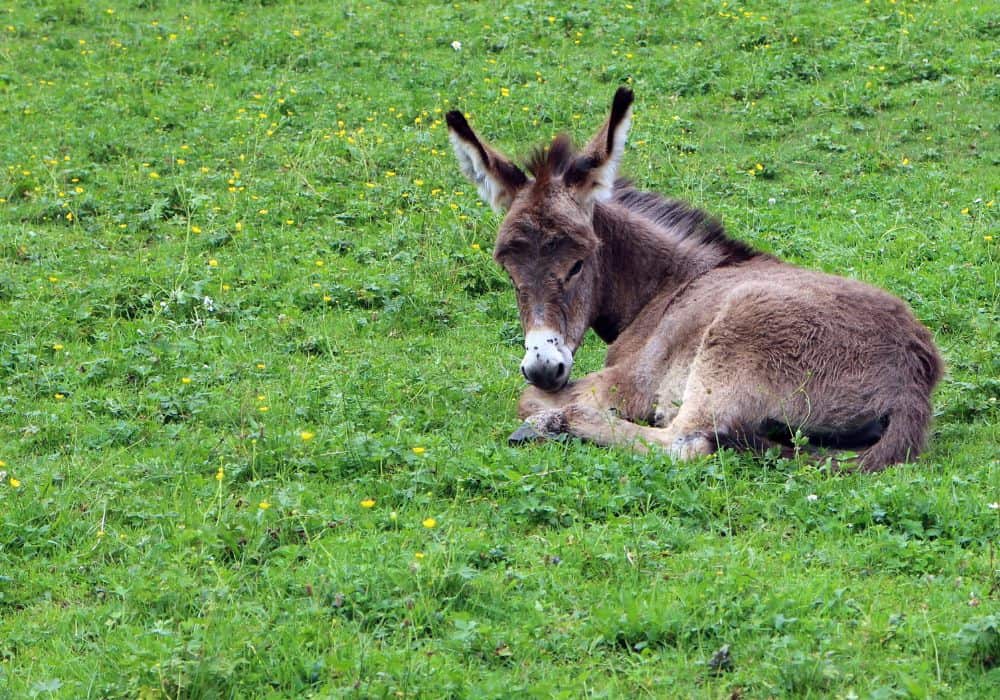
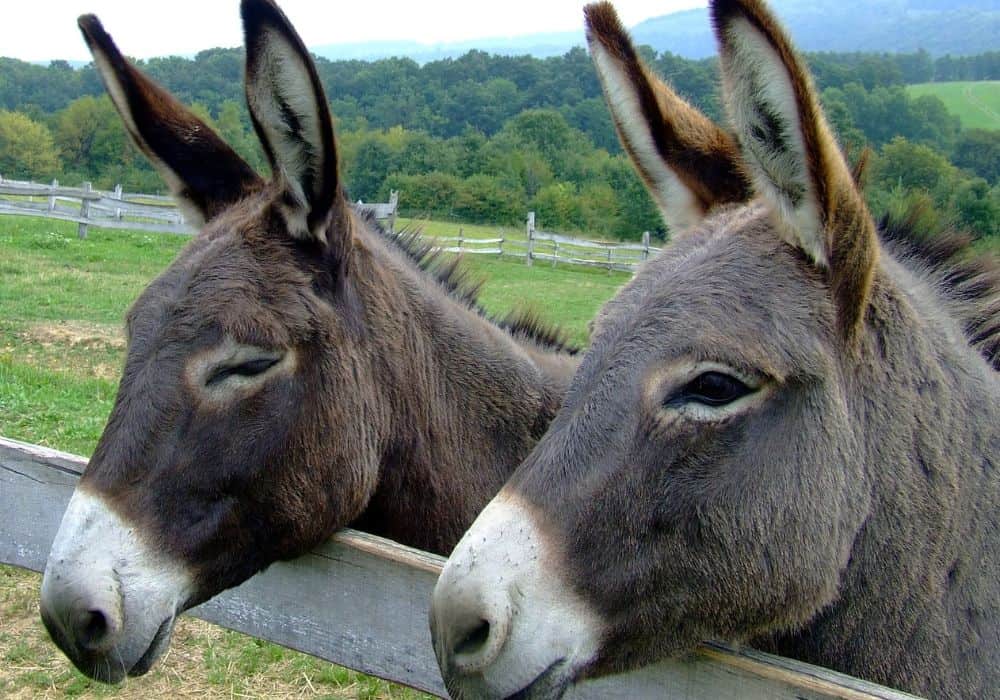
Thanks for that wealth of information l am taken back how well they will adjust to simple care non fuss and how intelligent they are l once heard they can find thier way through traffic jam. with out waiting for hours it is amazing .God as created every animal in wisdom
I just saw a gruesome picture on the internet of beasts overloading the donkeys backs with piles of bricks. It also looked like these beautiful, sweet animals had many scars on them from being beaten and tortured by these hideous monsters. Excess inventions are already out to move their disgusting bricks and all the inbred/hybrid can do is destroy the bricks immediately because their brain does not develop.